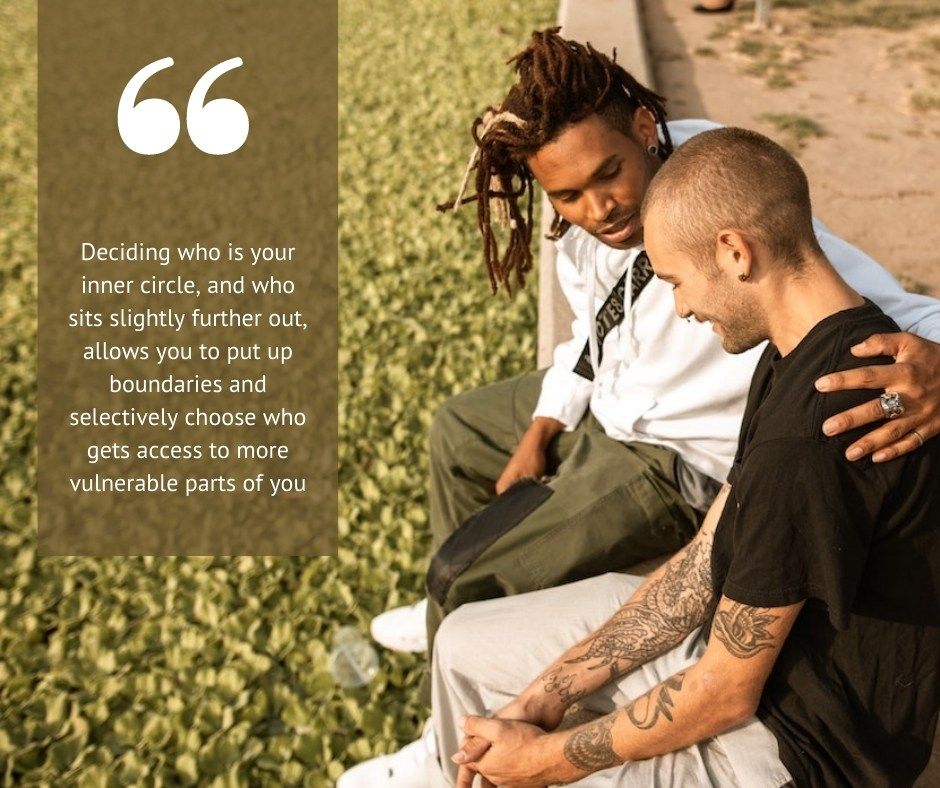Knowing what we’re willing to share, who has access to our inner circle, and when questions are crossing the line is one thing, but expressing it effectively is another. Here, we’re exploring how to set and maintain healthy boundaries
Boundaries are how we teach the world to treat us. They are all about what is and isn’t acceptable, and draw the line between who we are, and who the world wants us to be.
Particularly when interacting with another human who has different priorities, needs, and desires, boundaries are crucial in order to not blend into each other, and to be able to separate what they want from what we need. When we are unable to do that, this is when codependency, enmeshment, and simple confusion can occur. We lose sight of who we are, and our own identity when our daily decisions are formed by what others are asking of us.
When we lack confidence, it is tempting to cave to everyone around us, as we might be insecure that if we don’t, we will lose the people in our lives. This is why the easiest and simplest boundary, the one we first learn, is actually quite a hard word to say: no. When we are able to use our no accurately, our yes becomes more powerful.
Unfortunately, when we say no though, it can be inconvenient to others, and if you don’t stand behind your no, you leave yourself vulnerable to change your mind simply to make things easier for them. It can be really upsetting when people only want you around for what you can do for them, but, over time, you will reap the benefits of boundary setting. You will have more time and energy, you can say goodbye to burnout, and all the anger and resentment you are keeping inside you every time one of your boundaries is crossed can finally be relieved.
Here, we’re sharing some essential tips on how you can implement and maintain healthy boundaries in the three main relationship areas of your life.
Family relationships
One of the biggest complaints I hear about family relationships is that family members feel entitled to their opinions about your life, your job, your romantic relationships, and your body. How you can create a boundary around this is by limiting the information they have access to. This can be by stating: “I’m not ready to share that with you yet, but I’ll let you know when I am ready.” If they don’t know, they can’t have an opinion about it.
But, what if it’s too late and they already know? Then try saying: “I have already made my decision, and your opinions are not needed. I would appreciate it if you could be supportive.”
When it comes to conversations about your body, I encourage you to be firmer. Your body should never be up for discussion at a family event, and we need to stop normalising everyone commenting on changes in our appearance. In those situations, I simply state: “Please stop commenting on my body.” If this persists, I then say: “If you continue talking about my body, I am going to leave this conversation, and you can come find me when you are ready to talk about something else.”
Friendships
In my book, The Joy of Being Selfish, I explain that it is OK to have different tiers of friendships. Friends are allowed to have different amounts of access to you, and some friends are allowed to be a higher priority than others.
Deciding who is your inner circle, and who sits slightly further out, allows you to put up boundaries and selectively choose who gets access to more vulnerable parts of you. This is not because some are better friends than others (although it can be!), but, instead, because the healthiest people have a whole support network. It is OK to have friends for different occasions. Some are your friends you go to when you are crying, and some are your party friends, and we all need some of both.
The other issue that arises in friendships is that, as we age, our time becomes more in demand, and therefore we might not be able to go to every party or reply to every text instantly.
For invitations or events, it’s important your friends respect your first no, and trying to pressure a friend into attending is creating bad boundaries. You do not have to give a reason for declining; your no is enough. If someone continues to persist, then I reinforce the boundary by saying, “I already said no, and I need you to respect my decision.”
When it comes to texting, we need to stop measuring how much someone loves and cares about us based on how quickly they respond. This is where we have to understand that the world does not revolve around us, and their silence may not be personal. They could be going through something and, as their friend, they are owed a little benefit of the doubt. If it is upsetting you, communicate that rather than testing them. Try a simple, “Hey! I miss you, haven’t heard from you in a while, and wanted to check if you are OK?” Give them the trust you would hope would be extended back to you when you get busy.

Romantic relationships
It’s important to remember that your partner is not literally your ‘other half’; you are not one person, and setting good boundaries is about maintaining your independence within a romantic relationship.
We all hate it when we have that person who dips in and out of our life depending on their relationship status, so don’t be that person. Having good boundaries means doing what you say you are going to do, and being reliable when you make plans, so no dipping out of your commitments with friends just because a date comes along.
When it comes to the early stages of dating, remember they are a stranger. You should not be putting them at the top of your priority list instantly. Let the trust build slowly, and let them demonstrate via their behaviour that they are allowed more of your time and energy. We sometimes think we can’t communicate boundaries early on because what if it scares them off? I say let them be scared off by boundaries. You want to set a precedent for boundaries and if you establish the relationship without them, it’s a lot harder to put them in place when they have got used to you being a people-pleaser (or worse, a pushover!). If things end, whether it’s ghosting or otherwise, hold your boundaries by deleting their messages, phone number, and social media. You shouldn’t have to convince someone to want you, and by knowing your worth, you begin the healing process faster.

‘The Joy Of Being Selfish: Why you need boundaries and how to set them’ by Michelle Elman is available from all good book retailers (Welbeck, £8.99).


Comments